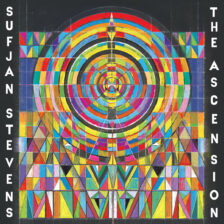When reviewing a new record from Sufjan Stevens, at this stage in his 20+ year career, the opening paragraph practically writes itself. You can start by recapping his much-publicized, albeit half-serious, ambitions to create an album about each US state; then discuss his (also ambitious) zany pursuits, many of which involve Christmas songs; then shift to his mid-career pivot towards spazzy electronica; and then take us to his critically acclaimed acoustic works over the past five years. Let’s forgo all that (at least any further) and just state the obvious fact that Stevens’s new record, The Ascension, adds to a singular, shape-shifting discography. Which, if you haven’t listened, or listened much, to any of this output, then I suggest you do not start with Stevens’s newest album, which is not necessarily a “for fans only” release but doesn’t consistently capture the magic of earlier records. Instead, let me suggest the first half of Illinois for dazzling orchestral Americana that sounds as unique now as it did 15 years ago; the last two songs from The Age of Adz for glitchier electronica rooted in folk, as if I’m Wide Awake It’s Morning and Digital Ash in a Digital Urn were synthesized into one record; and the middle of Carrie and Lowell for achingly vulnerable, sparsely arranged songs about abandonment, death, love, and forgiveness.
Read More “Sufjan Stevens – The Ascension”Review: Bright Eyes – Down in the Weeds, Where the World Once Was
On “Calais to Dover,” the penultimate track on Down in the Weeds, Where the World Once Was, Conor Oberst and company erupt into a huge, catchy, and devastating chorus, one that has all the trademarks of vintage Bright Eyes. There’s Oberst’s famously clever wordplay, where he examines his paralysis (“nothing is changing”) amidst a divorce (“everything’s changing”) while subtly playing with the expression “to state the obvious,” which, in its final declaration, closes the song like a gut-punch. Then there’s Oberst’s distinctively tremulous, emotive voice and the frantic energy that carries it; here Oberst’s trembling words pour out of him and, by the end of the song, he abandons words altogether and expresses his grief through a primal wail. And then there’s the glorious instrumentation, where a rush of pianos and shimmering guitars make the song feel massive—as they swell, it’s hard not to be swept up by the grandeur of the music and then, as Oberst’s clear vocals come into focus, be crushed by his sadness. The song encapsulates so much of the appeal of Bright Eyes: there’s often a simultaneous joy and pain in listening, as the group pulls you into their rich sonic world and then leaves you vulnerable to Oberst’s poignant lyrics. For these reasons, “Calais” is the standout to Weeds and one of the best Bright Eyes songs of the past 15 years. It’s also the album’s sole takeaway.
Read More “Bright Eyes – Down in the Weeds, Where the World Once Was”Review: Gleemer – Down Through
After two full-length albums and an EP, Gleemer have crafted a unique aesthetic. There’s a reason people simply tweet “gleemer” and fans get it: the band’s name is as much evocative of a sound—the glistening guitars that brighten the group’s otherwise dark, ruminative songs—as it is a visual style—nocturnal, impressionistic portraits, where, again, glimpses of brightness color an otherwise darkened image. On Down Through, Gleemer does not stray from this style, producing another, well, gleemery record—a series of night-dwelling songs saturated in gauzy static and laden with anxiety. This album both feels and sounds heavy, befitting this pandemic summer’s unrelenting humidity and pervasive sense of dread. For these reasons, Down Through can be both an exhilarating and exhausting listen.
Read More “Gleemer – Down Through”

